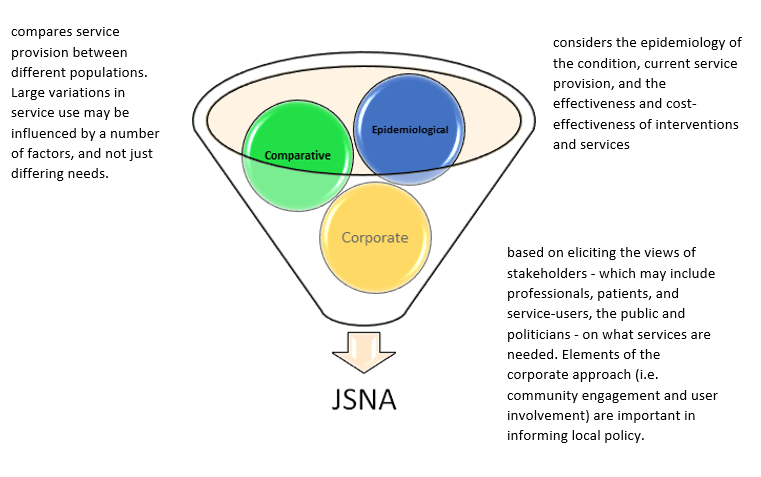Definitions & Terminology
Two key concepts are defined in this section.
a. What is a JSNA?
A JSNA is a collaborative process undertaken jointly with relevant partners, organisations and experts to evaluate the healthcare and wellbeing needs of a local population. JSNAs are key to informing and guiding strategic planning and the commissioning of health, wellbeing and social care services for the local population. This joint assessment allows those involved to gain a holistic understanding and description of the characteristics of the local population and identify any unmet need(s). A core component of a JSNA is defining the needs of a population through a health needs assessment approach as described below.
b. What is a health needs assessment?
Health needs assessment (HNA) is an essential tool to inform commissioning and service planning, and can be defined as a systematic method of identifying the unmet health and healthcare needs of a population, and making changes to meet those unmet needs. HNA allows for appropriate targeting of resources, and often involves working in partnership with other agencies, communities and service users. Indeed, HNA can be an excellent opportunity to involve stakeholders in service planning and increase ownership and sustainability. HNA may focus on specific diseases, population groups, procedures or interventions.
[Definition adapted from: The uses of epidemiology and other methods in defining health service needs and in policy development | Health Knowledge]
Approaches to JSNAs and HNAs
In practical terms, JSNAs and HNAs often incorporate elements of all three of the approaches outlined below.
- Epidemiological: this approach considers the epidemiology of the condition, current service provision, and the effectiveness and cost-effectiveness of interventions and services
- Comparative: this approach compares service provision between different populations. Large variations in service use may be influenced by a number of factors, and not just differing needs.
- Corporate: this approach is based on eliciting the views of stakeholders – which may include professionals, patients, and service-users, the public and politicians – on what services are needed. Elements of the corporate approach (i.e. community engagement and user involvement) are important in informing local policy.
Fig 4 . Illustrative figure of how the different HNA approaches contribute to a JSNA.

Click on the image to make it larger.